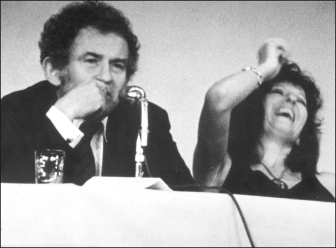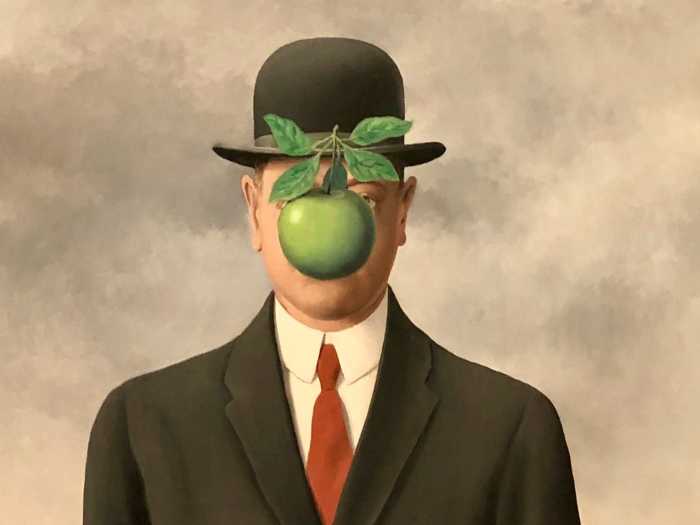By Jerry Tallmer
It was, Norman Mailer would some years later tell D.A. Pennebaker, “the night Jill Johnston turned my hair gray.”
Nor was Mailer kidding. It had. But Jill Johnston aside — a little hard to do, since she’s going to be very much on hand for the Culture Project screening of “Town Bloody Hall” this Friday, June 29, thirty-six years after the original tumultuous event — that not so very distant evening and this re-showing of the Pennebaker-Hegedus documentary that captured it lie not only at the midpoint of the 2007 Women’s Center Stage festival but as a sort of nexus of the whole hoorah of men and women trying to come to grips with one another under the spotlight of the Women’s Movement, yesterday, today, and of course tomorrow.
The five people on stage at Town Hall on that Friday evening in the spring of 1971 were Jacqueline Ceballos, then president of the New York chapter of NOW (National Organization for Women); Germaine Greer, the tall, dazzlingly beautiful Australian-born author of “The Female Eunuch” and other works; Diana Trilling, novelist, essayist, literary critic, teacher, intellectual at large; and the aforementioned Ms. Johnston, willowy wafty dance reviewer of The Village Voice.
Oh, and one other. Mr. Norman Mailer, then in his ungray curly-haired 48th year and once again a storm center, that time for a piece in Harper’s magazine, “The Prisoner of Sex,” which in (among other things) its defense of guilty-without-trial male chauvinists Sigmund Freud and D.H. Lawrence had sent much of the warrior-feminist world into a twitty.
He, Mailer, was in the chair, so to speak. The hot seat, of course. Much-married Norman set things off rather wittily, and of course provocatively, with the roguish: “I do have vanity, but I don’t have the vanity to think one man can take on four women.”
What I did not know, watching and hearing this and the next 88 minutes of the Pennebaker-Hegedus film, was that Mailer had asked for it.
“I knew Norman well,” documentarist Pennebaker said over the phone this past weekend. “Had known him for years. He came to me [before the Town Hall gathering] and asked if I was going to film it. I think he gave me $3,000 to buy the film stock. Like buying your own funeral,” Pennebaker dryly adds.
His wife and future filmmaking partner wasn’t his wife then. When, five years after the Town Hall mishegas, 24-year-old Chris Hegedus from Boston showed up at 51-year-old D.A. (“Penny”) Pennebaker’s New York workshop, looking for a job — “I think she was really looking for equipment,” he muses in an unprotested aside — all that 1971 footage by Pennebaker, Jim Desmond, and Mark Woodcock on camera, Robert Van Dyke on sound, was still lying around in cans, untouched.
“I didn’t know what to do with it. The only way I could think to edit it was for laughs. Jill Johnston and all these lesbians ganging up on Norman. Then Chris came. She said: ‘I know what to do,’ and we gave it to her to edit. A very Zen situation: The answer comes looking for the question.”
In point of fact, for many questions that night at Town Hall, raised by one or another of Mailer’s four panelists and various members of the audience — Betty Friedan, Cynthia Ozick, Anatole Broyard, Susan Sontag, etc.
Of them all, the most sensible, straightforward, and unappreciated, it seems to this viewer of the DVD, was Jaqueline Ceballos of NOW, who had had doubts about appearing, but because “it would be cowardly not to come here” in a moment when women — “overworked and underpaid” — had the right and duty “to have a voice in changing the world that is changing them,” proceeded without any histrionics whatsoever to lay down a few basic, minimal bread-and-butter demands:
Equal pay for equal work.
Payment for “women’s work.”
Equal Social Security.
Division of family money.
Vacations with pay.
When she added a few hard words for the advertising industry that treats women like “stupid servile creatures” who “get an orgasm whenever the kitchen floor is waxed,” the first angry male stormed from his seat and up the aisle to the exits. He wasn’t the last.
Norman Mailer did not follow. He called a heckler an asshole — he would later use much more heated anti-heckler language — and turned his attention toward the “distinguished young and formidable lady writer from England,” Ms. Germaine Greer, just to his left.
Two things — two things at least — were to be noted here. One, the deliberate and, once again, roguishly provocative wordage of “lady writer,” arousing the Pavlovian ire (okay, irritation) of both Ms. Greer and, a bit later, Susan Sontag. Two, the manifest sexual charge shooting like spark-gap between author Mailer and author Greer, whatever else their mouths may have been saying.
What they were saying went swiftly back — thanks to Ms. Greer — to Freud and Mailer’s shared awareness that the male artist does his art to gain “riches, fame, power, and the love of women,” while women artists (including guess who, Sylvia Plath) are to be remaindered as “either menials, or goddesses, or, worst of all, both.”
At that point the scene and the film bursts open with Jill Johnston — in shades, sackcloth, and long shaggy hair — a) putting down the gorgeousness of Germaine Greer, b) loudly proclaiming: “All women are lesbians who don’t know it yet, just the way all men of course are homosexuals,” c) deploring the fact that Abraham, the begatter of sons and grandsons who all have names while his daughters and granddaughters do not, lived 350 years, d) talking on and on and on, nonstop, past 10 minutes, past 15 minutes, past Norman Mailer’s several polite entreaties until at last he loses his temper with: “Jill, either play with the team or pick up your marbles and get lost … ”
Instead of picking up her marbles, Ms. Johnston rushes to the rear of the hall, picks up, literally, in her arms, a girlfriend waiting there for her, and falls with girlfriend to the floor of Town Hall to demonstrate for all the world to see what lesbians (in full clothing) like to do with one another. “We’re going down on Women’s Lib,” she cheerfully announces.
Well, it was all a little rich for Diana Trilling’s blood — nice, wise, humane Diana Trilling who, while being wounded by old friend Norman’s gratuitous injections (see above) of “lady writer” or “lady literary critic,” nonetheless put the following Q&A to everyone in that hall: “Are we always so sure we can name the enemy? I am pretty sure it is not Mailer.”
He, however, under a bit of further baiting, not by Ms. Johnston but from some yahoos in the audience, has finally exploded: “If you want me to be a clown, I’ll take out my modest little Jewish dick and put it on the table.” Not even Ms. Johnston opted for that.
Mailer was at his thoughtful best — finger alongside cheek, wagging a pencil for self-control — in acknowledging he’d be a fool to insist that biology (i.e., child-birthing) is destiny, but “there are going to be any number of victims in this [liberation] process,” i.e., children, of whom he has fathered nine. He also spoke some gutsy truths about the cowardice of women who bait men into violence — “but if he hits the woman he loses the argument” — with everybody in the hall knowing that Norman had once lost just such an argument in thrusting a knife into a wife.
The Women Center Stage screening of “Town Bloody Hall” will be 9 p.m. Friday in the Culture Project’s new Soho headquarters, 55 Mercer Street. As noted above, that showing falls roughly at the middle of this year’s series of some 25 events of theater, film, music, comedy, and conversation, all of it curated by Olivia (no relation to Germaine) Greer in this 11th year of WCS festivals. Among the many participating artists are Eve Ensler, Marisa Tomei, Samantha Power, Stacyann Chin, Elizabeth Swados, Julie Goldman, and Letty Cotton Pogrebin. The founder and artistic director of the Culture Project is a poor mere male named Alan Buchman.
When D.A. Pennebaker looks back at that April night in 1971, he remembers that an event scheduled for an hour ran on, instead, for three and a half, in the days when cameras ran out of film every 10 minutes — “so you had to scrunch down on chairs and change reels every 10 minutes.” Remembers also that Town Hall was then owned by NYU, “and NYU didn’t want us there, we had to sneak in, twice they threw us off the stage. It was the worst thing we ever shot, but later of course” — much later, after Chris Hegedus had come along to make some sense of the whole thing — “we decided that that had helped it. It kind of was a seminal end to a sexually charged last gasp of the ’60s.”
And the title? That same year of 1971 had seen the arrival of John Schlesinger’s no less sexually charged “Sunday Bloody Sunday.” I think, if you watch and listen very closely, you may hear Germaine Greer at one point murmur the words “Town Bloody Hall” as a sort of throwaway appraisal of the entire proceedings. As good as any, 36 years later.
For schedules, tickets, or any other information about Women Center Stage Festival 2007, call (212) 925-1900 or hit www.cultureproject.org.


































